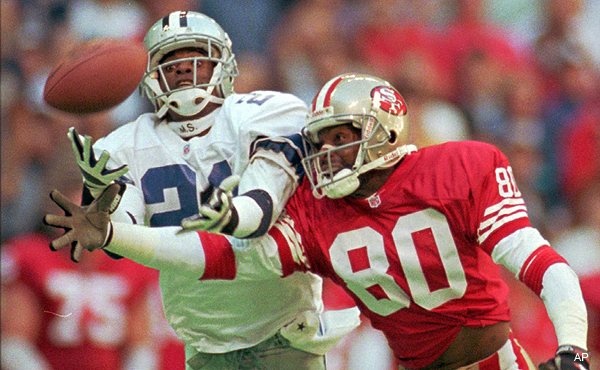*
In the first installment of a four-part series, Shutdown Corner was fortunate to speak to some of the game's best players, analysts, and Hall of Fame players about this year's class of HOF inductees. The first 2011 inductee is Deion Sanders, the ultimate shutdown corner appropriate, yes?
In his 13-year career from 1989 through 2005, Sanders intercepted 51 passes for 1,331 return yards and nine touchdowns, a pretty amazing total considering the fact that through most of his career, opposing quarterbacks were very reluctant to throw to his side of the field. Basically, once Sanders' sense of the game matched his raw athletic talent, he picked off just about everything that came into his area. And as a punt and kick returner, he was equally unstoppable he returned six punts and three kicks for touchdowns before the teams he was with realized that they were risking the health of their most important defensive asset on special teams.
Who better to talk about what made *Sanders great than the one receiver who had the talent to elude him on a regular basis? That's why we asked Jerry Rice to share his thoughts on Sanders. The two men were teammates on the 1994 Super Bowl champion San Francisco 49ers, and faced each other often when Sanders moved on to the Dallas Cowboys in time for the 1995 season. The best receiver of all time could beat Prime Time, but even he had to work at it.
I first asked Rice about Sanders' one perceived deficit as a player his reputation for avoiding contact, calling missed tackles "business decisions" and preferring to stick to pure coverage.
"Well, Deion would be the first one to tell you; he wasn't going to be one of those physical corners who would come up and make those really difficult tackles," Rice remembered. "He said, 'They pay me to cover, and they pay me to make plays,' and that was that. But we that when everything was on the line, he was going to be that shutdown corner. So, I think it's great that he's going into the Hall of Fame, but he was not one of those types of guys who would stick his nose in there and get really dirty.
"But the majority of cover corners when Ronnie Lott played corner, he was one of those guys who was going to try and tackle and stuff like that. Most corners want to cover, and if they get in there with the big guys, like the offensive linemen coming down, their careers aren't going to last that long."
I then asked Rice to recall what it was about him Sanders that made it so difficult to get past him to make a catch after all, Rice had perhaps the greatest sense of route concepts and how to break coverage than any other receiver in the history of the game.
"Speed," he said. "When Deion first came in, he was all about speed, and then he worked on his technique. That's when he became a complete football player. I, on the other hand, had to use two or three moves to get off the line of scrimmage. As a defensive back, with a guy that fast, he wants you to turn and run. You can't outrun him, so I would try to get him off-base at the line of scrimmage with a few moves, Bill Walsh always told me that you win at the line of scrimmage, and I had some success with that.
And what made him such a good teammate? To a man, the guys who played with Sanders will talk about the fact that he was so much more than his reputation. "Well, it was him and his entourage. We're talking about Prime Time, man. But the thing that people don't realize about him is that when it came time to play, he was ready. He had his little ritual -- he would come into the locker room before the game and lay his uniform out. But when it came to being that shutdown corner man, he was one of the best. He was right there with Rod Woodson and Darrell Green. I had to work a little harder to get free from those guys. It made me a better football player, and I really looked forward to those matchups. I mean, it was like Larry Holmes or George Foreman or Muhammad Ali the night before the big battle.
"We laugh about this now, but I remember the night before those matchups, I couldn't sleep, and he couldn't sleep. We were looking forward to those battles."
Next up? The great Marshall Faulk, and we have Rice and Marcus Allen to explain to us just why Faulk was so special.
|
|
|
Results 1 to 1 of 1
-
08-06-2011, 09:35 AM #1Administrator



- Join Date
- Jun 2007
- Location
- Canada
- Age
- 49
- Posts
- 60,709
- Blog Entries
- 3
- Downloads
- 9
- Uploads
- 12429
 Voices of the Hall: Jerry Rice on Deion Sanders
Voices of the Hall: Jerry Rice on Deion Sanders
Similar Threads
-
Madden 12 Ultimate Team (PS3) - Deion Sanders?
By Anton in forum GamesReplies: 0Last Post: 09-26-2011, 04:03 AM -
Voices of the Hall: Jerry Rice and Marcus Allen on Marshall Faulk
By admin in forum Sports NewsReplies: 0Last Post: 08-06-2011, 09:35 AM -
Is Sam Bradford the only rookie to play on the same team as Jerry Rice, Johnny
By Gingy in forum IntroductionsReplies: 8Last Post: 12-25-2010, 10:22 PM -
Jerry Rice headlines 2010 Pro Football Hall of Fame Class
By admin in forum Sports NewsReplies: 0Last Post: 02-07-2010, 01:01 PM -
Jerry Rice headlines 2010 Pro Football Hall of Fame Class
By admin in forum Sports NewsReplies: 0Last Post: 02-07-2010, 01:00 PM






 Reply With Quote
Reply With Quote

Bookmarks